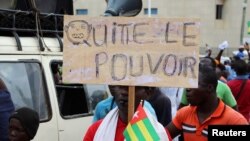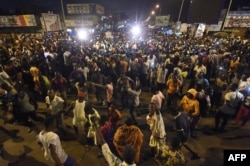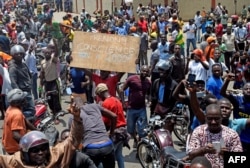Togo security forces fired tear gas at hundreds of anti-government protesters participating in a late night sit-in at an intersection in central Lome as part of a bid to end the 50-year-old Gnassingbe family dynasty, witnesses said Thursday.
The move to disperse the crowds comes after two days of countrywide protests involving tens of thousands of people that have amounted to the biggest challenge to Faure Gnassingbe’s rule since he succeeded his late father 12 years ago.
In the past, security forces have violently suppressed protests, killing at least two people during an opposition march in August and hundreds after the contested election in which Gnassingbe took power in 2005.
Opposition response unclear
But until late Thursday, police officers armed with batons had watched passively as protesters, wearing the red, pink and orange T-shirts of the opposition, danced and blew whistles as they wound through the streets of the capital Lome.
It was not immediately clear how the opposition would respond to the security forces’ intervention with tear gas late Thursday. The head of the main ANC opposition party, Jean-Pierre Fabre, had earlier pledged to remain seated on the tarmac of the Dekon crossroads until Gnassingbe left power.
“We want the end of this 50-year-old Gnassingbe regime.
“Enough is enough,” Kodjo Amana, a 42-year-old baker, shouted over a chanting crowd earlier in the day.
Internet outages
The protests in the West African country of 8 million people have proceeded despite widespread reports of network outages confirmed by non-governmental organization Internet Without Borders. Other African incumbents in Gabon and Cameroon have used network cuts to control criticism and suppress protests at sensitive times.
Residents said that text messages had also been blocked Thursday. The communications minister could not be reached for comment, although another minister said earlier this week that the cuts had been carried out for security reasons.
Skeptical of reform
The president’s father Gnassingbe Eyadema seized power in a coup in 1967, a few years after the territory known as “French Togoland” that was once in German hands became independent from colonial power France.
The current president this week sought to appease opponents by tabling a draft bill to reform the constitution and reintroduce a two-term limit that his father scrapped in 2002.
But opposition leaders are skeptical about the implementation of the reforms that the government has stalled on for more than a decade, and Prime Minister Komi Selom Klassou confirmed Thursday that the term limits would not apply retroactively.
That could mean that Gnassingbe, 51 and in his third term, could remain in power for two more mandates from the next election, until 2030.
Gnassingbe sent a Tweet from his official account Thursday, saying that he had met with the U.N. Special Representative for West Africa and the Sahel, Mohammed Ibn Chambas, on the subject of reforms. A spokesman for the latter confirmed the meeting without elaborating on its content.
State TV said Thursday evening that parliament, which still needs to approve the bill, will meet for an emergency session Sept. 12.
Position ‘very fragile’
However, if the protests resume, analysts say Gnassingbe may find himself isolated amid growing criticism of autocratic rule in West Africa.
“The president’s position is very fragile and we do not think his peers in ECOWAS or his friends in Europe will help him if things get ugly,” said the head of research at NKC African Economics, Francois Conradie.
Togo, a regional financial hub that aspires to be an African Singapore, is at odds with West African neighbors, which mostly have laws restricting presidential mandates.
The government, along with Gambia’s, voted in 2015 against introducing them across the 15 members of the ECOWAS regional body, which Gnassingbe currently chairs. Since then, Gambia’s longtime leader Yahya Jammeh has been voted out of power.
African rulers, notably in Rwanda, Burundi and Burkina Faso, have moved to drop term limits in recent years in order to remain in power. In some cases this has sparked strong opposition and led to violent unrest; in others, leaders have been driven from power, as happened in Burkina Faso.










